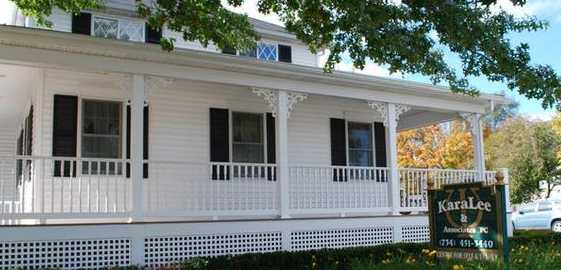Hawthorn Center

Questions & Answers
Help others like you find out more about Hawthorn Center. Do you know the answers to any of these questions? Contribute now and help others like you.
What kinds of care do they offer?
-
Mental health treatment
Includes interventions such as therapy or psychotropic medication that treat a person's mental health problem or condition, reduce symptoms, and improve behavioral functioning and outcomes.
-
Treatment for co-occurring substance use plus either serious mental health illness in adults/serious emotional disturbance in children
Housing for individuals recovering from substance abuse that is designed to provide a drug and alcohol-free living environment and appropriate support services to facilitate movement to independent living. Such housing includes transitional living, sober houses, sober living, recovery houses, and 3/4 houses.
What type of facility is this?
-
Psychiatric hospital
Licensed general hospital (public or private) that provides inpatient mental health services in at least one separate psychiatric living unit. This unit must have specifically allocated staff and space (beds) for the treatment of persons with mental illness. The unit may be located in the hospital itself or in a separate building, either adjacent or more remote, and is owned by the hospital. It may also provide 24-hour residential care and/or less than 24-hour care (e.g., outpatient, day treatment, partial hospitalization), but these additional service settings are not requirements.
What types of treatment approaches do they offer?
-
Individual psychotherapy
Focuses on a patient's current life and relationships within the family, social, and work environments through one-on-one conversations with a therapist. The goal is to identify and resolve problems with insight, as well as build on strengths.
-
Group therapy
Involves groups of usually 4 to 12 people who have similar problems and who meet regularly with a therapist. The therapist uses the emotional interactions of the group's members to (1) help them get relief from distress and (2) possibly modify their behavior.
-
Cognitive behavioral therapy
Involves recognizing unhelpful patterns of thinking and reacting, and then modifying or replacing these with more realistic or helpful ones. The therapy can be conducted with individuals, families, or groups, and clients are generally expected to be active participants in their own therapy.
-
Dialectical behavior therapy
A cognitive behavioral treatment approach with two key characteristics: a behavioral, problem-solving focus blended with acceptance-based strategies, and an emphasis on dialectical processes. "Dialectical" refers to the issues involved in treating patients with multiple disorders and to the type of thought processes and behavioral styles used in the treatment strategies. DBT has five components: (1) capability enhancement (skills training); (2) motivational enhancement (individual behavioral treatment plans); (3) generalization (access to therapist outside clinical setting, homework, and inclusion of family in treatment); (4) structuring of the environment (programmatic emphasis on reinforcement of adaptive behaviors); and (5) capability and motivational enhancement of therapists (therapist team consultation group). DBT emphasizes balancing behavioral change, problem-solving, and emotional regulation with validation, mindfulness, and acceptance.
-
Activity therapy
Includes art, dance, music, recreational and occupational therapies, and psychodrama.
-
Smoking not permitted
Smoking is not allowed.
What type of setting is this location?
-
Hospital inpatient/24-hour hospital inpatient
Medical treatment that is provided in a hospital or other facility and requires at least one overnight stay.
Who is responsible for the operation of this facility?
-
State government
Government of a country subdivision in a federal form of government, which shares political power with the federal or national government and must meet certain standards set by the federal government, but are free to expand beyond what exists at the federal level and improve services, access, and protections for consumers, such as mental health and substance abuse services, in that state.
What types of payment or funding do they accept?
-
Medicaid
A joint federal and state program that helps with medical costs for some people with low incomes and limited resources. Medicaid programs vary from state to state.
-
Private health insurance
What specific groups are treated here?
-
Children/adolescents with serious emotional disturbance (SED)
Facility has a program or group specifically tailored for children/adolescents with serious emotional disturbance.
What ancillary services are offered at this facility?
-
Court-ordered outpatient treatment
Known by different terms in different states, such as, ?assisted outpatient treatment (AOT),? ?involuntary outpatient treatment,? or ?mandatory outpatient treatment.? Forty-four states permit the use of court-ordered outpatient treatment as a condition for persons with severe mental illness, who are too ill to seek care voluntarily, to remain in their community. Each state has its own civil commitment laws that establish criteria for determining when court-ordered treatment is appropriate for these individuals. (https://www.crimesolutions.gov/ProgramDetails.aspx?ID=228)
-
Education services
Locate or provide educational services from basic literacy through a general equivalency diploma and college courses including special education at the pre-primary, primary, secondary, and adult levels.
-
Family psychoeducation
Helps consumers and their families and supporters, through relationship building, education, collaboration, and problem solving to: 1) learn about mental illness; 2) master new ways of managing their mental illness; 3) reduce tension and stress within the family; 4) provide social support and encouragement to each other; 5) focus on the future; and 6) find ways for families and supporters to help consumers in their recovery.
What age groups are accepted here?
-
Children/Adolescents
Facility accepts children/adolescents (12 or younger) for treatment.
What specific pharmacotherapy treatments do they provide?
-
Chlorpromazine
Chlorpromazine is used to treat the symptoms of schizophrenia and to treat the symptoms of mania in people who have bipolar disorder. It helps you to think more clearly, feel less nervous, and take part in everyday life. It can reduce aggressive behavior and the desire to hurt yourself/others. It works by helping to restore the balance of certain natural substances in the brain.
-
Fluphenazine
Fluphenazine is a decades-old antipsychotic medication used to treat schizophrenia and psychotic symptoms such as hallucinations, delusions, and hostility.
-
Haloperidol
Haloperidol is used to treat psychotic disorders and is also used to control motor tics and verbal tics in adults and children who have Tourette's disorder. Haloperidol is also used to treat severe behavioral problems such as explosive, aggressive behavior or hyperactivity in children who cannot be treated with psychotherapy or with other medications. Haloperidol is in a group of medications called conventional antipsychotics. It works by decreasing abnormal excitement in the brain.
-
Loxapine
-
Aripiprazole
-
Asenapine
-
Cariprazine
-
Clozapine
-
Lurasidone
-
Olanzapine
-
Paliperidone
-
Quetiapine
-
Risperidone
-
Ziprasidone
-
Antipsychotics used in treatment of SMI
A multi-disciplinary clinical team approach, helps those with serious mental illness live in the community by providing 24-hour intensive community services in the individual's natural setting.
Is vaping allowed at this facility?
-
Vaping not permitted
How do I apply for admission at this location?
Have you been to this facility? What was your experience?
Is there a wait-list for treatment center?
Is any payment required?
Related Posts
KaraLee and Associates PC
- Plymouth, MI
- 4.54 miles away

